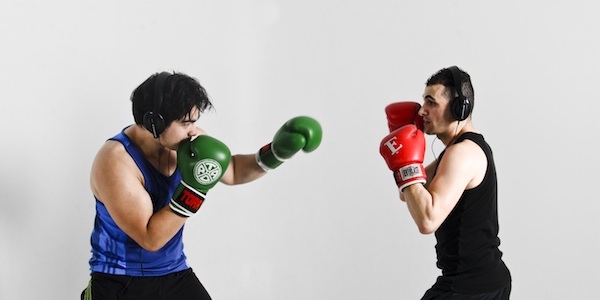Oades hung out in boxing gyms and male dressing rooms for 18 months to create I’m Your Man – ‘a sweaty, energy-fuelled study of a contemporary masculine drama.’ She describes a boxing gym as a ‘place of dreaming.’ “I fell in love with the space,” she says. “The boxers are so disciplined; to see athletes honing their craft – it’s a beautiful thing to watch. There are beautiful relationships between men; some are mentors, some have been in gaol, they come from different backgrounds, they’re different ages.
“I’m Your Man is the third part of a trilogy,” she explains. “After looking at the social and political, I wanted to look at the literal physical aspects of courage. We followed a local hero, Billy ‘the Kid’ Dib, a young boxer on his quest for the World Title belt. He wore a mike belt and we captured the moments of action.” Sport is theatre, thinks Oades. “Melbourne knows that more than any other city,” Oades observes. “I’ve been here three years and am surprised at the number of artists who embrace sport.” It’s so different in Sydney – there it’s a great divide.”
The actual words of the boxers themselves form the text of the show. “I have an unusual technique I call ‘headphone verbatim’. The actor is speaking the exact words of the interview – every word is real. The sweat is real. There’s a lot of authenticity in the work. I was the one doing the interviewing and the audience experiences it as if they were me. Sometimes I was flirted with in the way that the hyper- masculine sort of man can relate to women; I wanted that reproduced.”
The actors aren’t a physical match to the characters they’re playing, Oades says. “We’re playing around with gender and age. A woman plays one of the characters but her vocal style is that of a man. It’s not parodied as a hyper-male in a female body; you imagine the original man. Because the original voices have such fidelity the audience works out early that what they’re seeing might not be true. You can’t trust what you’re seeing but you can trust what you’re hearing.”
Did Oades experience scepticism from the men she interviewed or worse, hostility? “Through this I have met the most generous-hearted people of my life,” she answers. “I learnt how generous and vulnerable these warriors were.” Did she feel safe around men who have chosen violence as a way of life? “I wasn’t scared. I was respected by the boxers. I did get nervous at the World Title Fight – people were throwing garbage cans around, fire hydrants, there was such a level of adrenaline and there was little old me with my tape recorder. But through boxing, men with any sort of violent tendencies or anger management issues, it gets filtered in a positive form. At this level of professional boxing it’s a disciplined world. I don’t think you could be safer. It’s people who don’t have a channel for it who are dangerous. It’s interesting being a woman in this situation; there are a lot of advantages – you get very different responses than if you were a man asking the questions. With boxers their job is to knock their opponent out so there is a violent motivation. As to the ethics of boxing, as an artist I didn’t want to go beyond story telling. We are witnessing – what the audience will experience is up to them, the audience can take their own interpretations, make their own judgements. I’m Your Man is a documentary about courage and fearlessness. There’s a lot of disadvantage in the history of boxing. Look at boxing and it contains the history of disadvantage in our society. Indigenous boxers, like Lionel Rose. There’s a young African boxer, an orphan from Nigeria. He came to Australia to compete, his motivation for fighting is to raise the funds to bring his little brothers over from Lagos. What’s a few brain cells if you’re saving your family? Being a boxer is an opportunity to change your life, obtain respect.”
Was it difficult to gain the men’s trust? ”The psychology around being a boxer involves fearless self talk, the rhetoric of ‘I’m the best’. So I was developing trust in terms of men who were still fighting; I had to get them to talk about their fears, to get behind the layers of what boxers go through. Older ex-boxers like Tony Mundine were happy to talk. They love talking about their careers .They trusted me. People love to be really listened to. When they’re talking about what they love they forget the tape recorder. The challenge was in explaining why I was there. It’s an unusual piece of theatre. I had to be transparent but it was difficult to explain the work. When Billy Dib finally saw it he said ‘I thought you were making a documentary’, even though he’d never seen me with a camera.”
BY LIZA DEZFOULI

